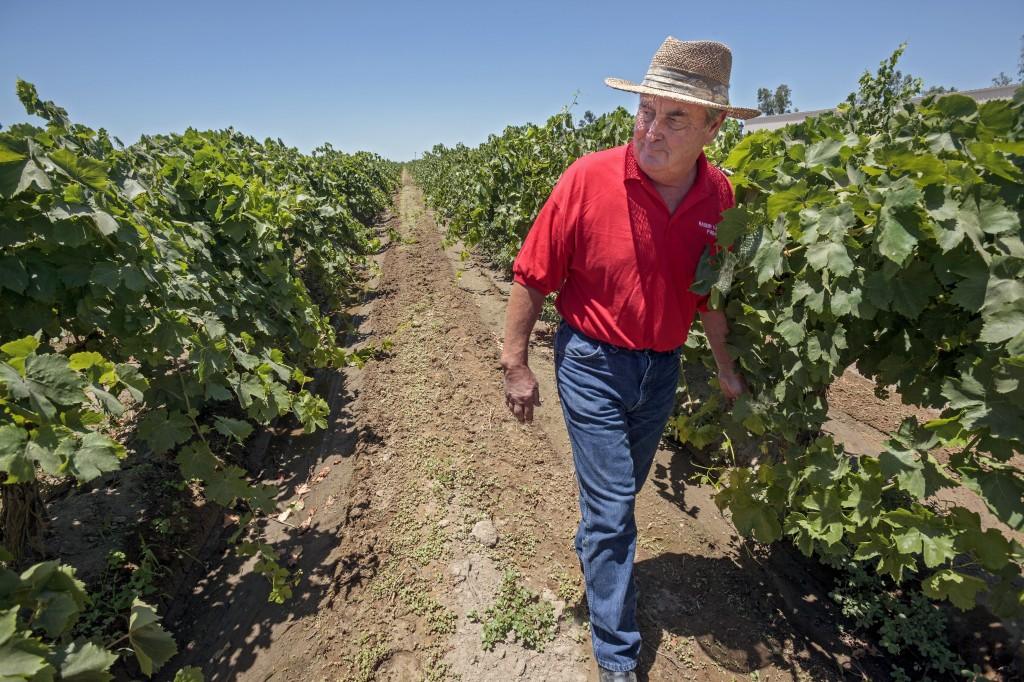
Raisin growers are fighting back against the USDA. Struggling small farmers have banded together and told the federal government they will no longer turn over 47 percent of their raisin crop to the USDA each year. A little known and antiquated Depression era law still on the books allows the United States Department of Agriculture to seize nearly half of raisin farmers’ crops each year to “hold in reserve,” thus manipulating the supply and market price.
The 47 percent of raisin crops the growers are mandated to give up annually ultimately wind up being sold to foreign buyers at minimal costs or given to the public school system. The small amount of money raisin farmers were eventually given by the federal government for nearly half their yield has dwindled significantly in recent years. When a lifelong California raisin growing couple found out that they were to get absolutely no compensation for the government mandated crop turnover, they decided to fight back in a court of law.
The Fifth Amendment states that private property will not be taken for public use without compensation. The USDA apparently feels it is above the law and the words of wisdom our Founding Fathers used to frame the nature of America. The USDA maintains they did not violate raisin farmer Marvin Horne’s rights because they did not literally come onto the land and take his property. They merely enforced a farming regulation.
Any agriculture regulation which orders a farmer to turn over even a single plant to the government violates the spirit of the Fifth Amendment and should be revoked. Not surprisingly, many small farmers have lost their land or given up raisin growing altogether because they simply cannot pay their bills when the government takes 47 percent of their crop. Horne has been facing bankruptcy due to the unconstitutional federal intrusion into his business. The proud raisin grower owns and operates the Kerman, California-based Raisin Valley Farms.
After he opted to sell all of his raisins on the open market and not turn any over to the federal government, letters announcing hefty fines began arriving in the mail. The USDA levied about $650,000 in fines against Horne. The amount now totals more than a million dollars due to interest on the unpaid fees. In addition to the huge amount of fines, the USDA also wants 1.2 million pounds of free raisins from Horne. Since he refused to turn over 47 percent of his crop and sold them all, the federal agency feels slighted and is demanding their bounty.
The Agricultural Marketing Agreement Act was passed in 1937 during the Great Depression. The farming regulation was reportedly enacted to “protect” poor growers by way of controlling the supply and demand for grapes. Exactly why the government manipulation of raising growing passed constitutional muster and has remained in effect for so long is most definitely unclear. The raisin law also states that the government can take “a percentage” of raisins from farmers without offerings payment and can feed them to animals, sell them to foreigners, or toss them in the trash if they so choose. The USDA essentially has the power to do anything with the raisins as long as they are kept off the American market.
They pledged their lives, their fortunes, and their sacred honor so that we could be free!
Marvin Horne once noted that the USDA raisin policy makes him feel like a serf and is a “rape of the raisin growers.” Brian Leighton, Horne’s attorney, is rightfully arguing that forcing raisin farmers to turn over any percentage of their crop to the government is a violation of the Fifth Amendment. The raisin grower’s concerns finally reached the Supreme Court last month, more than a decade after the citizens stood their ground and refused to turn over their property to the USDA. The court ordered that a California Federal Appeals Court take a fresh look at the Fifth Amendment violations voiced by Marvin and Laura Horne. The 9-0 ruling in favor of the raisin growers pave the way for possible revocation of the law.
 Raisin grower Marvin Horne also had this to say about the government taking 47 percent of his crop:
Raisin grower Marvin Horne also had this to say about the government taking 47 percent of his crop:
“I didn’t choose to fight. All I choose to do is pack and market my own raisins. They’re the ones who picked the fight. USDA and the Raisin Administrative Order picked the fight, not me. The hell with the whole mess. It’s like being a serf. I believe in America and I believe in our Constitution. And I believe that eventually we will be proved right. They took our raisins and didn’t pay us for them.”
The raisin growing law also allowed for the creation of the Raisin Administrative Committee based out of Fresno, California. The commission has the authority to set raisin prices by figuring out exactly how many of the dried grapes will reach the domestic market. The Raisin Administrative Committee is controlled by the USDA. During a recent raison growing season, the federal government reportedly earned $65 million from one years’ worth of free grapes seized from American growers.
If Marvin Horne and his wife win their case, a ripple effect could occur for farmers growing other crops, according to a Los Angeles Times report. The Raisin Administrative Committee is only one of many similar boards created under the Agricultural Marketing Agreement Act of 1937.
As the report stated, the boards “prop up” prices for various farm and agricultural products. If a bumper crop of raisins is expected during any given season, the board could take a bigger percentage of the grower’s property to control supply and demand, and create a market availability they feel is productive. If the goal of the Raisin Administrative Committee and similar boards is to help growers and farmers, they do not appear to be doing a good job.
The high percentage of raisins taken from Horne to prevent a price drop did not prevent him from suffering financially. An overabundance of raisins on the market may not have driven prices down, but the amount left to sell after the government seized its share did not leave the couple enough money to make ends meet. The 68-year-old raisin grower had to decide between getting a loan from the bank to remain solvent or selling over some acreage to cover his expenses. The fiscally responsible senior citizen did not want to accrue more debt, so he sold off some of the land he had worked so hard to purchase in 1969.
Do you feel the USDA is infringing upon raisin growers and farmers Fifth Amendment rights?









